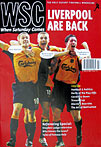 The job of refereeing is being made even more difficult than before because players and managers increasingly refuse to admit when they are in the wrong, says Philip Cornwall
The job of refereeing is being made even more difficult than before because players and managers increasingly refuse to admit when they are in the wrong, says Philip Cornwall
Anyone who doubts how much pressure referees are under these days needed only to listen to David O’Leary explain just why his Leeds team had failed to qualify for next season’s Champions League, after they came up one point short of Liverpool’s total. It all came back to the fact that in the last minute of their match with Manchester United on March 3, with the score at 1-1, a Wes Brown own goal was disallowed for offside. “Those two points have cost us. One man’s decision has made a big difference to us.”
At the time, O’Leary said: “No United players appealed for offside, and Wes Brown clearly thought he’d conceded a goal. The linesman gifted them an offside decision.” Football isn’t cricket; you don’t have to appeal. O’Leary’s case centered on the fact that it was Brown who played the ball, so how could it have been offside? As David Lacey wrote in the Guardian: “At Elland Road Viduka was offside when Bowyer made contact with the ball. Brown’s intervention, therefore, was irrelevant.” But because O’Leary shouts from the rooftops that the decision was a wrong one, that is probably how it will be remembered by most people.
Referees have always had a hard time, but are now under attack from the kind of blame culture that leads to those ambulance-chasing lawyer adverts: “An accident at work, a fall anywhere, or failing to qualify for the Champions League – it’s somebody else’s fault”. Elsewhere, there has been some extraordinary amnesia this season. Stéphane Henchoz maintained after the FA Cup final that he did not know that he had handled the ball, and still later that while he had handled it, he didn’t mean to. Anyone with the benefit of the slow motion replay to see him slam his elbow down at the last moment to turn the ball behind knows that he did deliberately handle the ball, that the pace the ball was travelling he would have felt it pretty resoundingly – and that he also has unexpected talents as a stopper.
No one really believes Henchoz, they just think the officials should have seen a high-speed offence that only Thierry Henry had a decent view of. But Abel Xavier, and most of Portugal according to some papers, has spent the entire season denying that he handled the ball in the Euro 2000 semi-final against France. The more they repeat the lie, the more they believe it. Black is white, night is day, and, as Peter Beardsley says: “Kevin Keegan’s got everything in terms of a manager.”
To make matters still harder, many of the game’s top pundits – and professionals – are ignorant of something as basic as that handball law. Andy Gray, Ally McCoist and Terry Venables were all happy to conclude from the first replays they saw in the Cup final that Henchoz had handled the ball accidentally, but that it was a penalty. How, when the laws specify it is only an offence if someone “handles the ball deliberately”? Confronted by the rules by cuddly Des, Venables came back with his clinching: “Aha! If this was true, then why did fouls have to be intentional?” Because the laws say so, you dolt.
What can be done to close the ignorance gap? Now that Howard Wilkinson is introducing a compulsory qualification for managers, of the kind they have in Italy, is it too much to ask that passing a refereeing course should be part of it? It would also be enjoyable to see the critics try to officiate themselves. One of the marvels of the continued employment of Trevor Francis as a pundit by Sky is his uncanny ability to call more or less every offside decision incorrectly at the first time of asking.
But it is more likely that the officials will be left to deal with the consequences of others’ shortcomings. There are, of course, good referees and bad referees. But even the best ones make mistakes. Making them professional won’t change that. How long before a high-profile controversial decision leads to appeals for a professional referee to lose his job? And how long before that clamour mounts when the official is actually right, but those doing the shouting simply don’t know the laws of the game?
From WSC 173 July 2001. What was happening this month